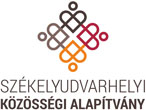We start a new series of interviews to presents some local stories of philanthropy. The goal of the series is to makes understandable and gets closer the philanthropy and the pleasure of supporting to the people.
- When did you started to be philanthropic, to donate?
I’m the second child among the four children of a worker, peasant family. My parents worked in a factory and the earned money was spent for the maintenance of the family. Before or after the working hours, they took a job in the local agricultural cooperative, we hoed and mown, and we put food to the family table through this job. For our job, we got forage. We were keeping animals and we were feeding them with the grain, plants and hay, if they reached the slaughter weight, we slaughtered them.
It was a great event when we slaughtered a pig or calf. This gathered the whole family. Everyone ate as much as he wanted at this time. After the pig slaughter, my mother and my grandmother packed black pudding and liverwurst taster for the widows in the village, because these women couldn’t slaughter a pig. Always the smallest child took the taster for these people, which didn’t have money, but they had great heart. They always gave something for me, because they didn’t like to remain in debt. At this time, and before the holidays the gypsy woman from the neighboring village arrived and my mother always gave a package for her too. I learned from my predecessors that all good or bad act has a repercussion to the donor.
- What it means for you the philanthropy? Why do you support community affairs?
My family has a goal, that we will do our best so the people, especially the young people don’t emigrate to a foreign country. For this we try to create and maintain workplaces, so our staff can earn money which is necessary for their family. Through the paid taxes and fees, we contribute to the development of the region and for the operation of state institutions. The state allows to spend a part of our profit tax to improve the quality of life of the community. We use this opportunity. We give tenth part of our generated and raised profits to a fund addressed to help our brothers who are sic or have other hardness.
In our mind the corporate social responsibility isn’t a right, but more a duty, because who got more, will be asked to give back more.
- What kind of effect had the donation to your life? Do you have a special experience or story about this?
After the applicant sends the request to us, we examine it in each case, that the descriptions in the document are same as the reality. The requiring or the applicant should be participating on personal audition. These conversations and on-site visits are like spiritual practices. We meet with many variants of diseases, burned houses owners, leaders of unusable institutions, evicted families, addicted people and flood victims. Sitting down with these people, listening their stories, identifying and taking part in their derailed lives, is a real life experience.
- What do you think, how should be the after-life of a donation? What is your advice to the applicants?
We had some projects, which we started without an existing community need. We considered that the community needs the facility dreamed and finished by us. When we put in use this facility, the community didn’t felt as her own. Almost ten years have passed until the people received and started operating the facility. They expect until today too, that the foundation covers the consumables and the finances what is necessary for the maintenance.
Now we only participate in projects where the community is the initiator, is participating in the implementation and give their own money to the project too.
I don’t want to hurt anybody, but we have implementations which are operated by the foundation for many years, because the community didn’t feel that it’s her own. But it may be that we were wrong.
A part of the communities can’t or doesn’t want to dream, to plan, to organize, to search help and supporters for the implementation of their plans and to operate the implemented facility with decency. We have to learn to account with the support, and if we are grateful, we have to learn to express it, because the supporter needs the feedback.
I have experienced that the individuals know the above mentioned things, but when it comes to community collaboration, there is more to learn from the western communities. We have no other choice, we must develop in this direction, because the different call for applications support this too.



